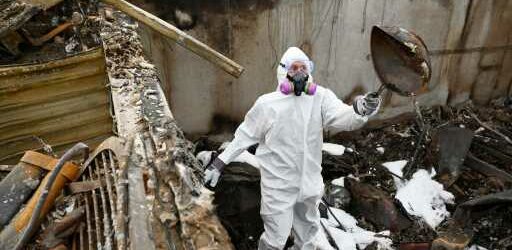Faced with clearing the debris of hundreds of homes incinerated by the Marshall fire, Boulder County is entering a high-stakes world of government contracting where tens of millions of dollars will be spent in a short time so people can begin rebuilding their lives.
The competition between the companies that do this disaster-recovery work is fierce. Such projects can be ripe for fraud. And any mistakes Boulder County makes in overseeing its soon-to-be-awarded cleanup contract could leave local taxpayers holding the bill without repayment by the federal government.
Already, two companies competing for the contract raised red flags in the days after the Dec. 30 wildfire, warning Boulder County that it was on track to jeopardize millions in federal reimbursements by not following proper procurement procedures.
And a former director of the Federal Emergency Management Agency who lives in Boulder County said he’s concerned about how the county is going about hiring a contractor to clear the mess left by the 6,000-acre wildfire that destroyed 1,270 homes and businesses — a loss of more than $500 million.
“If an audit is performed by FEMA or the inspector general and they find they didn’t do it the right way, then FEMA has to ask for a part of the money back and the taxpayers are on the hook to pay it. That’s why it’s so important to do it the right way,” said Michael Brown, who was head of FEMA under President George W. Bush from 2003 to 2005.
Boulder County Attorney Ben Pearlman said the county intends to do everything the right way so the people who lost homes in Louisville, Superior and parts of unincorporated Boulder County can rebuild their lives.
“Obviously, there’s a tremendous amount of cleanup to be done, and it’s a very important contract for us,” he said.
Eleven companies submitted bids to clear fire debris from private property, and the county expects to pick a contractor as early as this week — possibly at Tuesday’s county Board of Commissioners meeting.
Red flags raised about contract
Last month, two national companies that specialize in disaster recovery sent letters to Pearlman to warn him Boulder County would jeopardize federal aid for cleaning up burned houses unless it followed the rules in place for contracts.
They urged Boulder County to put the cleanup contract out to bid, something county officials later did — as, they said, they’d always intended.
The project could cost more than $100 million, industry experts say. The federal government typically reimburses 75% of that cost, but, last week, Colorado’s two Democratic senators, Michael Bennet and John Hickenlooper, and U.S. Rep. Joe Neguse, D-Lafayette, wrote FEMA and President Joe Biden to ask that the federal government repay 100% of the contract’s cost.
The two companies — Ceres Environmental Services and AshBritt — raised questions about an existing contract that Boulder County signed in 2017 with a third company to perform debris-removal work after disasters, according to the letters, which The Denver Post obtained through a Colorado Open Records Act request.
Representatives from the two companies declined to comment.
“Proceeding under this dated, non-compliant procurement contract quite simply puts Boulder County at significant risk of incurring obligations which will not be reimbursed by FEMA,” wrote Bernie Buescher, a lawyer at Ireland Stapleton, a Denver firm retained by Ceres Environmental Services, which is headquartered in Sarasota, Florida. That letter was dated Jan. 13.
Another lawyer, Sarah M. Mercer of Denver-based Brownstein, Hyatt, Farber and Schreck, on Jan. 8 wrote to request a meeting with someone in the county attorney’s office to talk about the contracting process. Mercer, who represents AshBritt of Deerfield Beach, Florida, also included a two-page memo outlining problems she found with the county’s existing contract and the pricing schedule for debris-removal work.
On Jan. 18, the county opened bidding on a Marshall fire cleanup contract by publishing a request for proposal, or RFP, on the Rocky Mountain E-Purchasing System website.
The existing contract — signed in 2017 with Galveston, Texas-based DRC Emergency Services — was awarded so Boulder County would have a company on standby to help clean up after natural disasters. But the contract was for jobs that cost less than $500,000, according to public documents.
While AshBritt and Ceres feared Boulder County would use that contract to hire DRC for the Marshall fire recovery, Pearlman said that never was the plan.
“I can’t speak to their concerns, but there never was a time when Boulder County wasn’t going to do an RFP and go through the process to get us the right contractors to do this work,” Pearlman said.
A representative of DRC referred questions to a county spokesman.
Ceres, AshBritt and DRC are among the 11 companies that have bid on the Marshall fire debris-removal work, Pearlman said. He said he was prohibited from revealing how much the various companies bid to do the work.
Since the bids came in, the county’s purchasing and public works departments have been analyzing the offers. As late as Thursday, the county was asking the companies for additional information, including sending out a questionnaire so the 11 companies could disclose any past legal troubles.
Very specialized work
In the United States, only a handful of companies specialize in cleaning up burned buildings, cars and other debris after a large natural disaster such as a wildfire or a tornado.
It’s a competitive field where millions of dollars are at stake, and industry observers say the companies play hardball with each other, hiring lawyers, lobbyists and consultants to help pave the way for lucrative contracts. Those lobbyists and consultants are on the ground in Boulder County.
It’s complicated work because of the hazardous material exposed by burned construction material and household products that melted in the heat. Most damaged homes will need to be completely razed to eliminate unstable structures and contaminated soil. All of that must be disposed of in approved landfills and the companies that do the work must account for every load hauled away.
Already, Boulder County has collected spoiled food and removed burned vehicles and vegetation from public roads. Curbside collection of items ruined by smoke and wind from homes that weren’t destroyed is ongoing.
The county used DRC to do some of that work, based on the 2017 contract, said Andrew Barth, a spokesman for Boulder County Public Works.
But the big job will be removing the ruins of the burned homes and businesses where everything from drywall to electronics to furniture to household cleaning products burned, leaving behind toxic waste. Most sites will have asbestos waste that must be hauled to special landfills certified to handle it. Many foundations, retaining walls and several inches of topsoil will need to be removed.
Brown, the former FEMA director who resigned after controversy over the federal government’s response to Hurricane Katrina, warns that such cleanup contracts are vulnerable to fraud because local governments are under pressure to help people rebuild their homes as quickly as possible.
“Debris removal can become — I want to emphasize I’m not accusing anyone in this situation — but debris removal companies can be less than stellar,” said Brown, who currently hosts a morning talk show on Denver’s 630 KHOW.
For example, companies being paid by the ton in the past have dug out extra soil to increase the weight of their loads, Brown said.
“That’s the kind of fraud that can be committed if someone wants to be unethical about what they are doing,” he said.
FEMA will want to know that Boulder County followed the correct process and hired a company that doesn’t have a checkered past. As FEMA director, Brown said he made calls to governors and mayors to tell them money was being withheld or needed to be repaid because of mistakes.
And errors in the cleanup ultimately could slow the recovery for residents who just want to put their lives back together, he said.
“It is a hardball competitive process, which is why I emphasize the state and the county do this exactly right,” Brown said. “They have to be certain that the company they hire has a good reputation for doing things right.”
Source: Read Full Article




